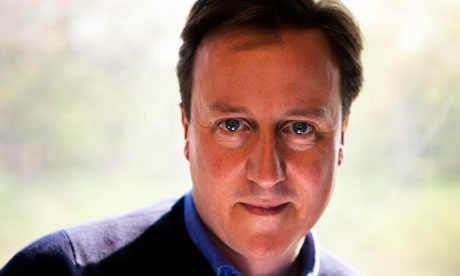The coalition is determined to break the grip of Whitehall centralism, writes the prime minister in today's Observer.
A few conclusions can be drawn from Tony Blair's book. One: politicians should keep quiet about their animal instincts. Two: factionalism is fatal. Three: little is ever achieved unless government has a clear purpose and sticks to it. New Labour did not have that purpose. And I am determined this coalition government does not make the same mistakes. That's why we've been setting out the clear purpose that, come what may, will keep this coalition on the right track.
As the deputy prime minister said on Thursday, part of that purpose is a horizon shift – moving away from short-term calculation to taking the long-term decisions that will ensure Britain's success. Here, I want to set out the other major change we plan: a radical redistribution of power away from central government and to people. I predict your eyes rolling. Successive prime ministers have promised to give power away, but Britain has become one of the most centralised countries in the developed world.
We are going to turn the tide. We will be the first government in a generation to leave office with much less power in Whitehall than we started with. Why? Because we feel the importance of this in our heads as well as our hearts. There's the efficiency argument – that in huge hierarchies, money gets spent on bureaucracy instead of the frontline. There is the fairness argument – that centralised national blueprints don't allow for local solutions to major social problems. And there is the political argument – that centralisation creates a great distance in our democracy between the government and the governed.
But we feel it in our hearts, too. We are optimists. We believe that when people are given the freedom to take responsibility, they start achieving things on their own and they're possessed with new dynamism. Multiply this transformation by millions of people and you'll get an idea of why we are so passionate about this power shift.
The drive for devolving power is shared right across the coalition. For years, Liberal Democrats have campaigned for a more local politics. And in the Conservatives, MPs such as Douglas Carswell have led the way by developing radical policies on decentralising power. So how exactly will we do it? We must begin by pushing power down as far it will go, straight to individuals.
One way of doing that is by spreading choice. For instance, NHS patients will get more freedom to choose where they get treated. And to give people an even wider choice we will increase competition in public services by inviting new providers in. That's what we're doing in education with a generation of new free schools.
Next, we're giving more power to neighbourhoods. Neighbours will be able to shape the look and feel of local housing developments, take over the running of local parks and post offices, and generate their own energy. After that, we will give more power to local government. Of course, some argue that the greatest power of all would be to let local government raise more of its own revenue and decide how to spend it. This raises many questions and we won't find the answers overnight. But judge us by what we've already done – like ending excessive ring-fencing of local budgets and giving councils new powers to set up banks and own assets. This isn't tinkering. People have been taken aback by the speed and extent of what Eric Pickles is doing, for instance, in abolishing the Audit Commission. And, in terms of revenue, we are allowing councils to keep money when they attract business to their area or build new homes.
Of course, there are some centralised responsibilities that are more difficult to devolve straightaway – but that's not to say we can't start relaxing the grip of central control. Take our principle of rewarding public service providers for good results. In welfare, drug rehabilitation and the reduction of reoffending, we are opening up the system to new providers, letting them get on with the job and paying them by the results they achieve. No interference from on high – just real power for professionals.
Finally, we're changing what happens in government. For too long those in power made decisions behind closed doors, released information behind a veil of jargon and denied people the power to hold them to account. This coalition is driving a wrecking ball through that culture – and it's called transparency. You have already seen unprecedented information about top people's pay in the public sector. This is helping to drive culture change more widely, including at the BBC.
And from next month we will be launching our new Transparency Framework online to replace the previous system of top-down targets and control. It will contain an unprecedented amount of information about what each department is doing – the reforms they plan and the impact they're making. All this information will be presented in clear English: no jargon – and no targets. Instead, it will all be there for people to make their own minds up about how departments are performing. It really is a revolution at the heart of government.
The age of centralisation stops here. For a long time we had a government whose words were "for the people" and whose actions were against them. We are determined to be different. Yes, we're going to have to change the culture of government and stand up to some powerful vested interests. But the fact is this country wants and needs this power shift – so, I promise you, we will see it through.
David Cameron, the Observer
